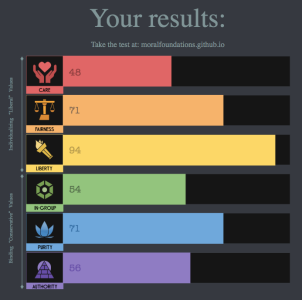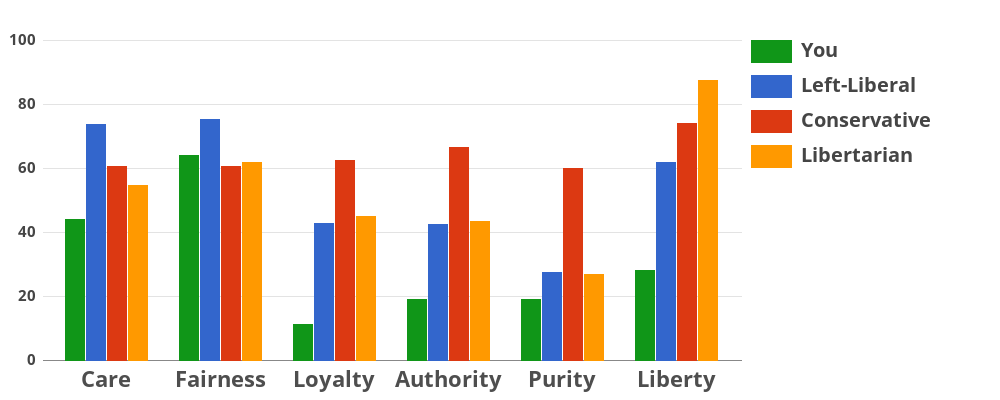I haven't taken the test yet, but based on the descriptions posted above, I predict that I'll lean strongly towards Care and Fairness; with a balance of Liberty and Authority; and almost no value placed on Ingroup-Loyalty or Purity. We'll see.
---
so this question is asking if i am against the inheritance of like dragon's hordes of money/wealth/power, but the problem is that its got a built in assumption that the alternative to that is pure meritocracy when like. i think that some amount of inheritance is good, theres a further amount thats bad, and the ideal situation is where no one has "little to nothing" cos theres like UBI etc, no one can really inherit power but people can pass down wealth thru a family just not. so large an amount that its a problem. but idk what the question even means by "large sum"? where does that fall relative to the line that i personally draw for whether a sum is "too large". i think i answered "slightly agree"? but i dont remember
I take the question to be about balancing the extremes, whether there's a "healthy middle" or not. e.g. 'as long as there are people with nothing, should there be people who have a tremendous amount'?
Ok so we start by talking about governments and then we assume that nations are necessarily involved when like. i personally believe the most moral world is one that does have governments and yet does not have nations. and often times the interests of the nation are in conflict with the people who live within the borders it enforces. so yeah thats also throwing off the analysis.
I think I have to understand this question by putting an emphasis on the word "and": '[...]prioritize the interests of their own nation
and those who currently live in it.' That at least eliminates the governments who pursue what they perceive as the nation's interests without regard for the people who live there, and also those who view the population as serving the interests of the state/nation and not the other way around. Then the question boils down to whether good government takes a global view or a nationalistic one.
I ended up going for no opinion since I side with a secular state (separation of church and state).
Sometimes it seems like they're talking about culture, and sometimes about governance.
This one I have quite a delema since I reserve the death penalty for murderers, et even they shouln't be subjected to cruel and inhumane
That one seems almost like a binary question to see if we're psychopaths. "Yes, there are things that would be going too far." or "No, there is no punishment I would consider too extreme."
Vaccination and drugs are very different. The latter harms the individual, the former protects society. Putting them together here makes me disagree with the statement - my position is more like: mentally-sound adults should have the legal right to do what they want to their own bodies even when it may be detrimental to their health provided it does not put others at risk of harm.
Wars are not pandemics. The shuttering of public spaces to limit the spread of an airborne disease is not the same as putting restrictions on voicing dissent against / in support of an invasion or the like. This is very much a pattern of putting things that might seem superficially similar together, when in reality the actual impact and consequence value judgement is vastly different.
I think I have to interpret these questions as being about uncompromising individual liberty, at the expense of other considerations. If a question lumps two things together, then the question is asking whether I accept
both of those things, not one or the other. That's how I feel I have to understand it, at any rate. If one of the two things seems to push harder against individual liberty (or freedom of speech, freedom of religion, the right to petition the government - whatever I think the crux of the question is), then
that's the one the question is really interested in, and the one I ought to think hardest about. imho.








